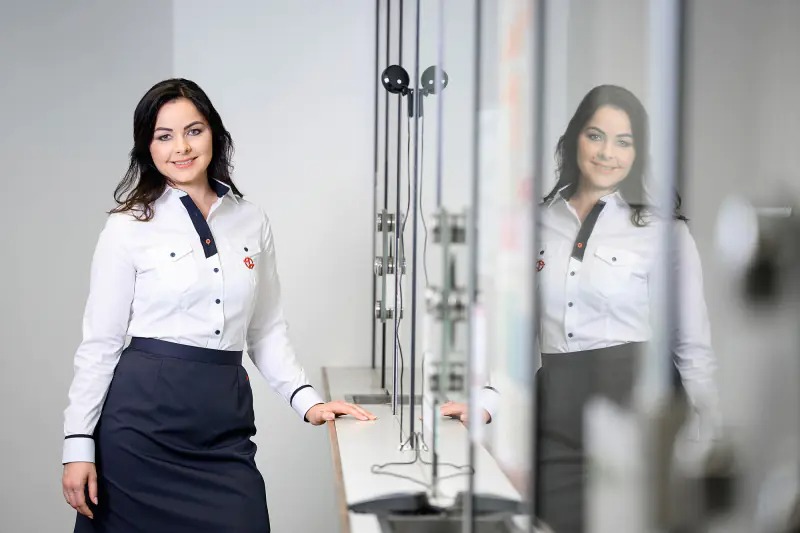A serious accident occurred on Monday morning just before 8 a.m. in Prague’s Palmovka district, where a tram hit a woman who was with her two small children.
The woman became trapped under the tram and had to be rescued by firefighters. One of the children, a three-year-old girl, was also injured.
The accident took place on Zenklova Street, near the Palmovka tram stop.
“There was a traffic accident involving a tram and a pedestrian, who was trapped under the tram,” confirmed police spokesperson Richard Hrdina.
The woman was with her two children—a three-year-old girl and a five-year-old boy—at the time of the accident.
Firefighters were quickly called to free the woman. “In Zenklova Street, we extricated a person from under the tram and handed her over to paramedics,” the Prague fire department posted on X at around 8:45 a.m.
Two rescue teams, along with a doctor and an inspector, responded to the scene. The woman was taken to Vinohradská Hospital, and one of the children was also injured.
“The woman sustained multiple injuries but remained conscious,” said Jana Poštová, spokesperson for Prague emergency services. “The three-year-old child suffered bruises and abrasions, while the five-year-old boy was unharmed.”
All three were taken to the hospital for further treatment. “The police are investigating the cause and circumstances of the accident,” Hrdina added.
Would you like us to write about your business? Find out more
The company Spojujeme is opening the Dark Kitchen bistro in Vinohrady.
The bistro serves breakfasts, lunch menus, and à la carte dinners. Dark Kitchen focuses on international cuisine and popular dishes, emphasizing seasonal ingredients, variety, and nutritional balance.
Wine lovers will be drawn to a curated selection of wines and champagne from 60 suppliers. The bistro also serves as a showroom for the catering company of the same name.
The new Dark Kitchen bistro, from Spojujeme, has brightened up Řipská Street in Vinohrady. The key to their popular, simple dishes lies in the quality of ingredients and their proper preparation. This principle forms the foundation of the entire kitchen team’s work at Dark Kitchen.
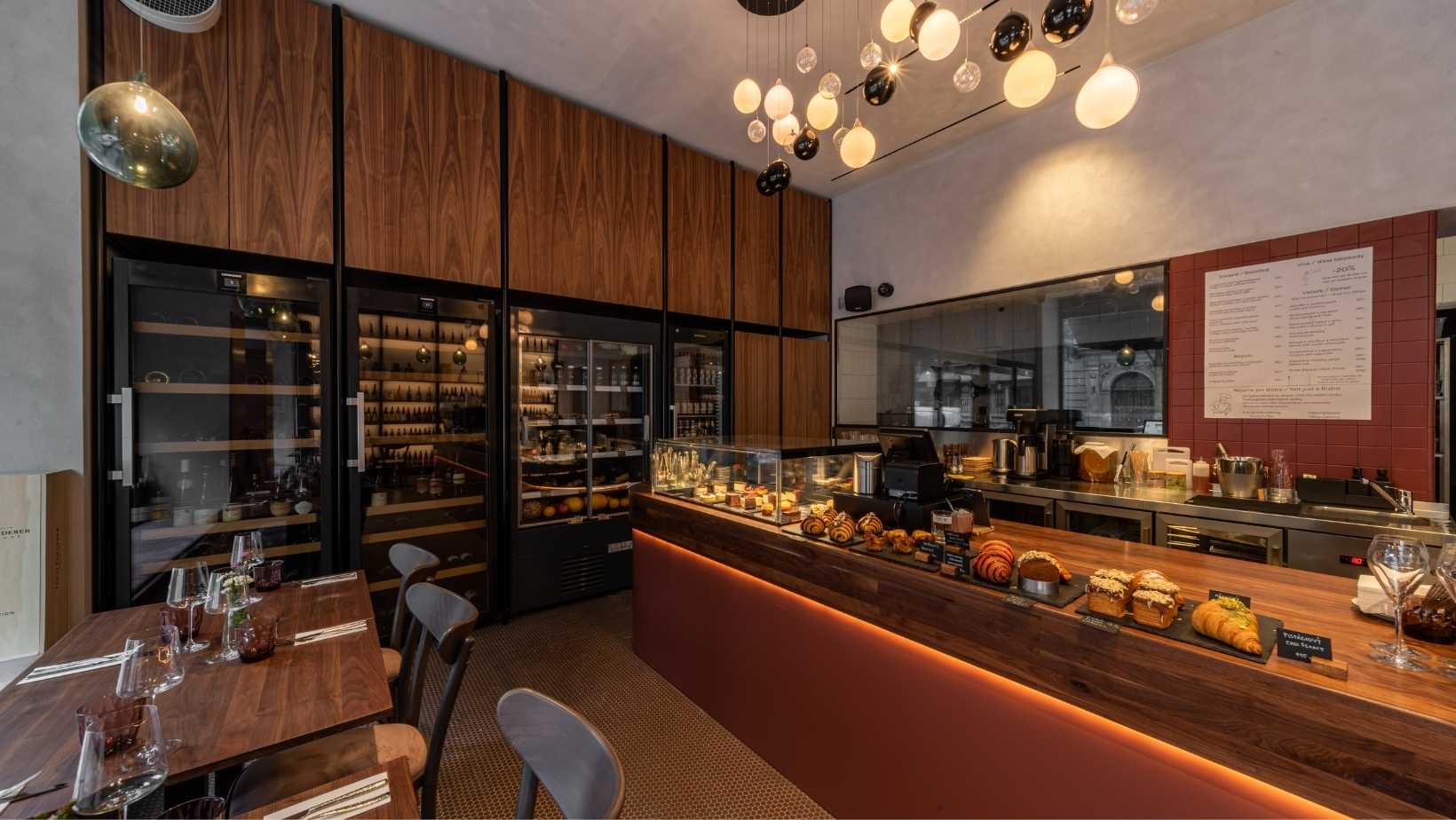
From morning onwards, French pastries (viennoiseries) are baked on-site in a bakery with a full production cycle, and complete breakfasts are prepared. From eggs made in various ways to granola, delicious pancakes, and warm sandwiches—all meals are made from quality ingredients and inspired by modern culinary trends.
Don’t forget to try the bistro’s specialty: scrambled eggs with truffles. Did you know that it takes 72 hours to prepare a croissant? Through the large window in the bistro, you can watch the entire baking process.
View this post on Instagram
Dark Kitchen’s lunch menu follows a concept of seasonality and freshness, offering a new selection of soups, fresh salads, and warm meals every week. For those constantly on the go, there is also a wide range of takeout options.
The evening menu features not only innovative appetizers but also time-tested classics among the main courses. Start your evening with delicious appetizers like gin-marinated salmon, baked beetroot with goat cheese and plums, or lamb with hummus.
Among the main courses, you shouldn’t miss the homemade ravioli made from the finest dough with ricotta and truffle or the octopus with caponata, a treat for those who love new flavors. For meat and fish lovers, the bistro offers a USDA PRIME ribeye steak and baked sole. These dishes are served in portions for two to highlight their quality and flavor.
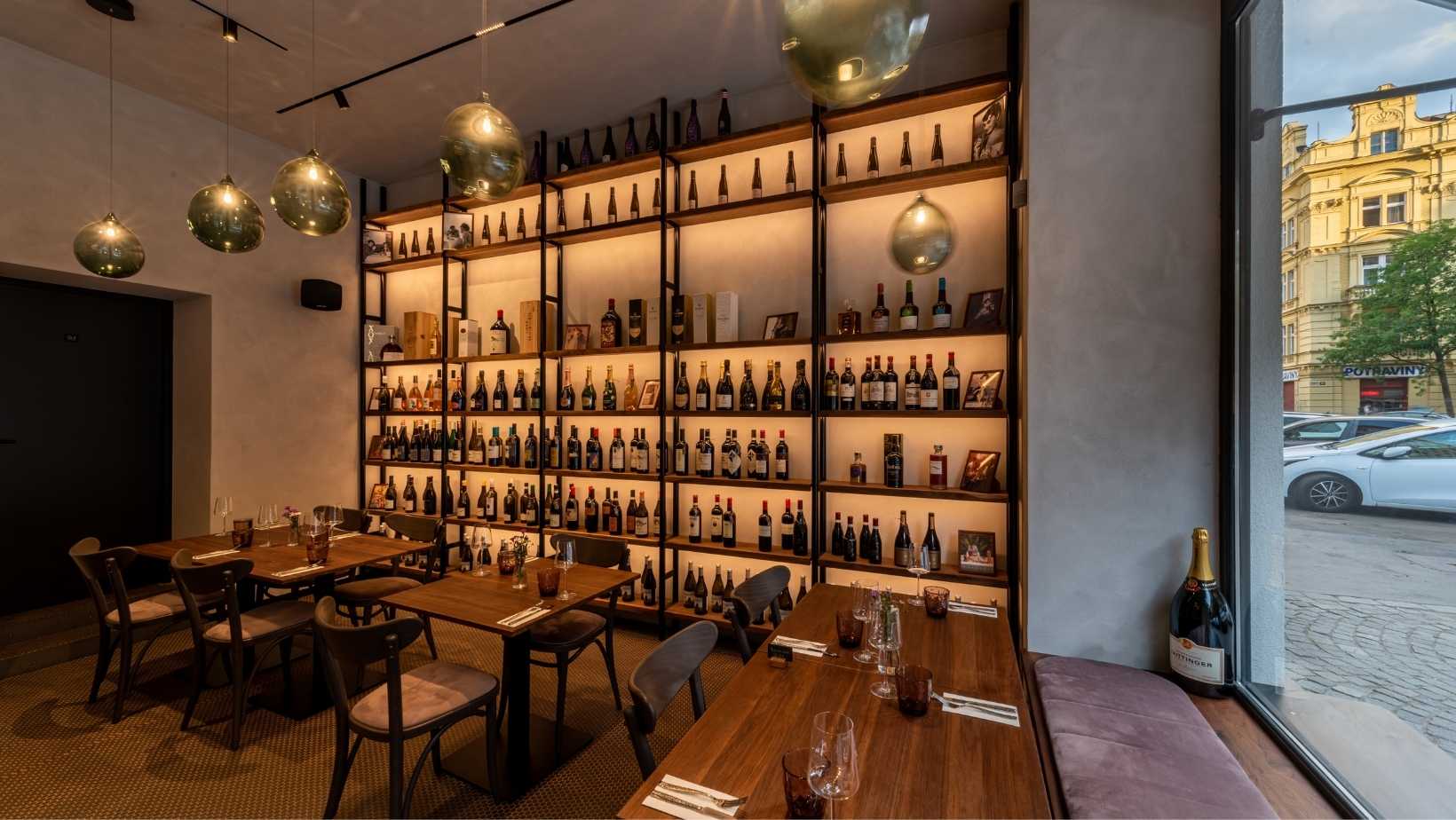
The love for wine
Wine and champagne enthusiasts will be thrilled by the curated selection of bottles, which can be enjoyed during dinner or taken home. The offering includes Austrian Riesling and exclusive Pierre Jouet champagne. A diverse selection of wines from Czech, Italian, Austrian, German, Spanish, and French producers makes an absolutely unique wine selection in Vinohrady.
“We have put maximum effort into our wine selection, together with our sommelier. The wine wall at Dark Kitchen features carefully thought-out bottles of wine that you’d hardly find together anywhere else. Customers can choose from these wines either to enjoy on the spot or take home with a 20% discount,” says Alexandra Pavlištíková, the manager of Dark Kitchen.
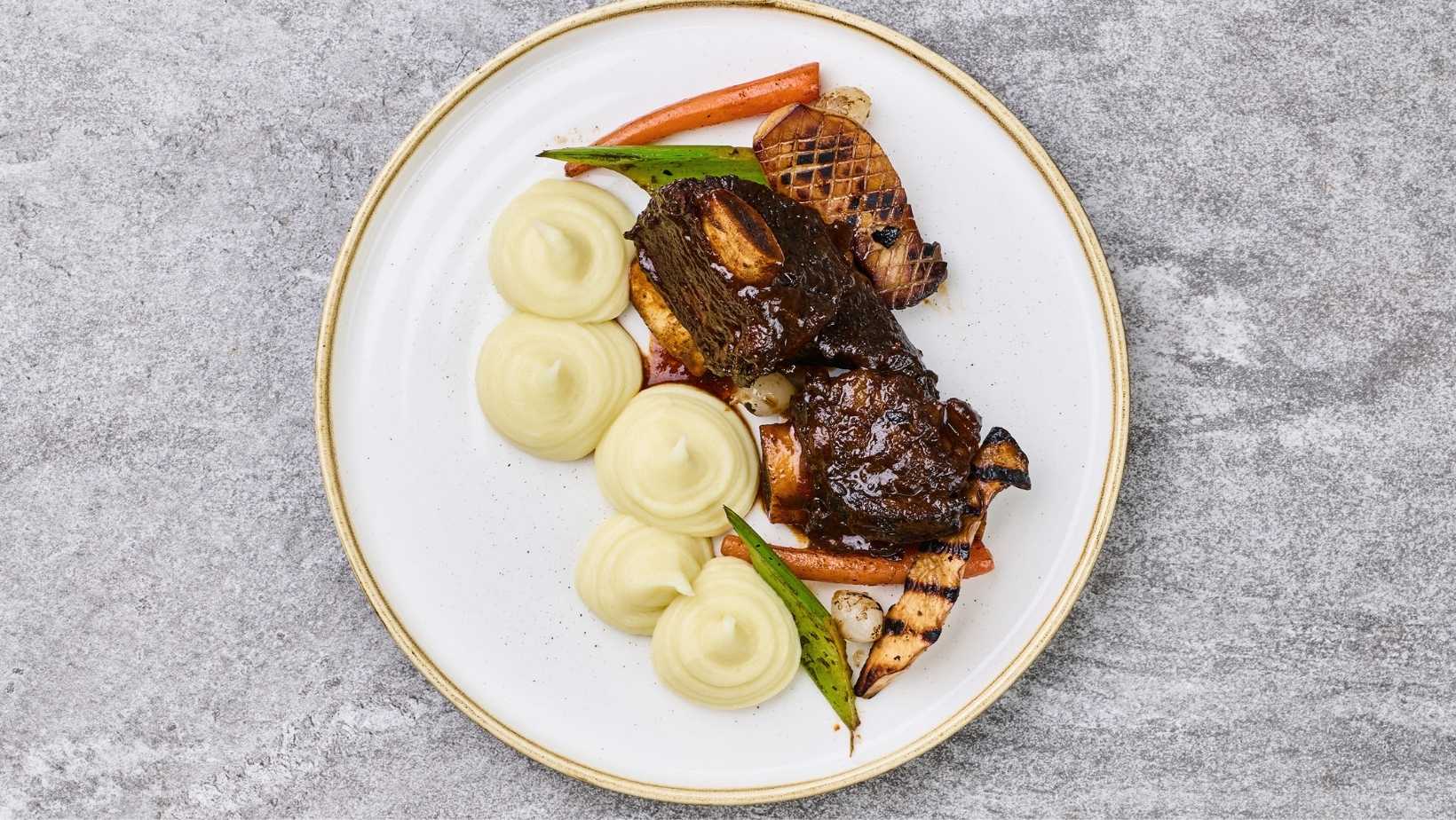
The Dark Kitchen bistro also serves as a showroom for the catering company of the same name. A display case full of canapés, sandwiches, and their own pastry products is always ready and can be tasted on-site or mixed and taken away.
You can find the Dark Kitchen bistro in Vinohrady at Řipská 1054/12. Visit for a great brunch, a hearty lunch, or a modern dinner with a glass of wine. The bistro is open weekdays from 7:30 AM to 11:00 PM and on weekends from 9:00 AM to 11:00 PM.
SPOJUJEME
The Spojujeme brand encompasses related projects that share knowledge and experience in gastronomy, space rental, and entertainment. It connects event spaces for every occasion and offers services to agencies as well as B2C customers and private individuals, providing them with full comfort and services. Spojujeme is a member of the Czech Event Association.
The Spojujeme family includes:
- Restaurant Spojka Karlín
- Spojka Events – an event space in Karlín
- Endorfin – a multifunctional space with escape rooms
- Dark Kitchen – catering with a showroom and bistro in Vinohrady
- Foyer Café – Art Nouveau event space and café in the Fantova building at Prague’s Main Railway Station.
Would you like us to write about your business? Find out more
McDonald’s employed victims of modern slavery, an investigation has found.
A criminal gang forced 16 victims to work at a branch of the burger chain in Caxton, Cambridgeshire, where they were exploited for years before police intervened.
One victim was said to have worked a 30-hour shift, despite the UN’s International Labour Organization saying excessive overtime is an indicator of forced labour.
The victims, whose passports were confiscated, were also forced to work in a bread factory in Hertfordshire which supplied the Co-op, Asda, M&S, Sainsbury’s, Tesco and Waitrose.
A criminal network led by brothers Ernest and Zdeněk Dreveňák trafficked victims from the Czech Republic and forced them to work between 70 and 100 hours a week. The two brothers were convicted in relation to this.
While victims lived on a few pounds a day in cramped accommodation – including a leaking shed and an unheated caravan – police discovered their work was funding luxury cars, gold jewellery and a property in the Czech Republic for the gang.
On several occasions, victims escaped and fled home only to be tracked down and trafficked back to the UK.
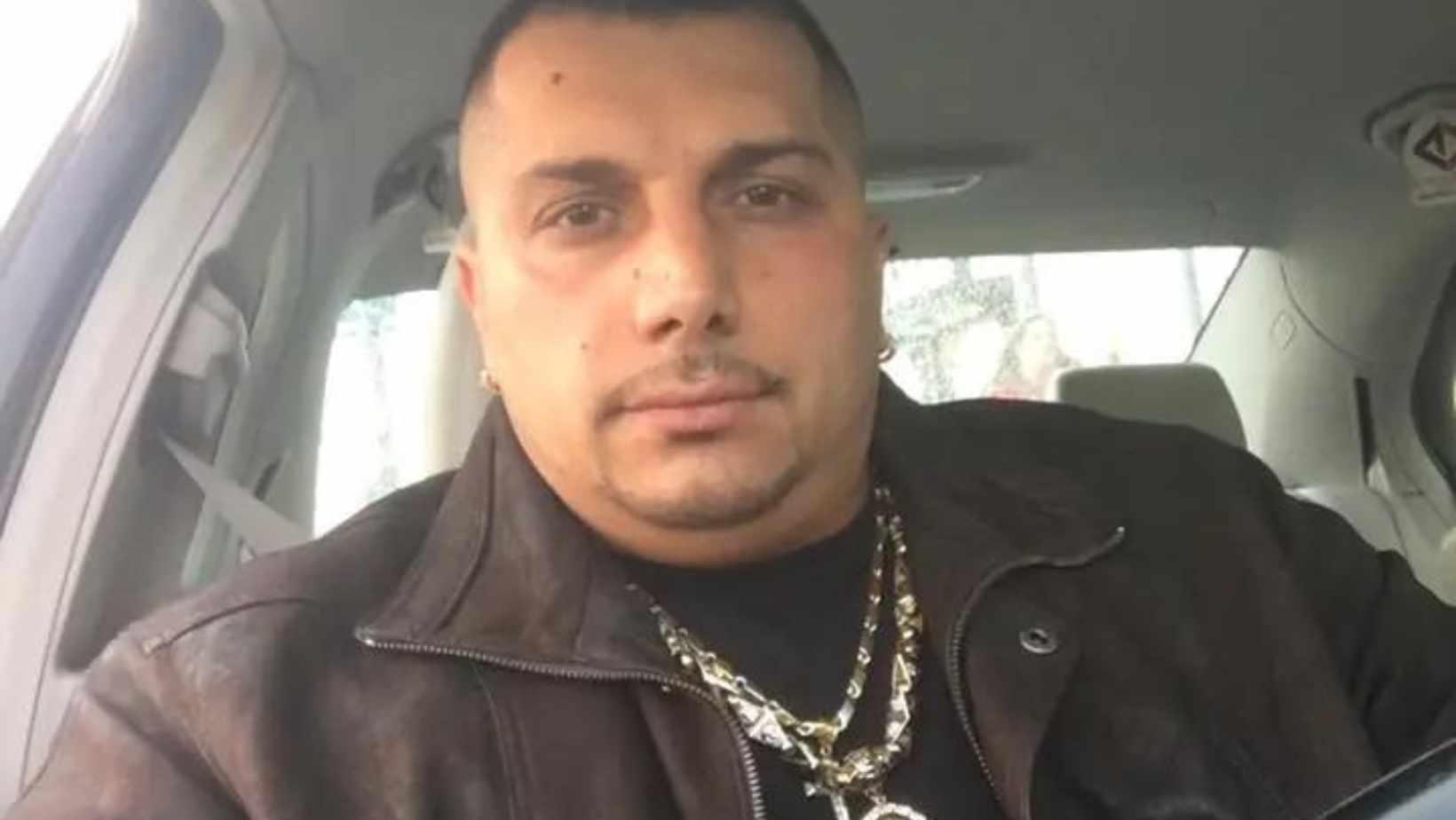
Ernest Dreveňák
The victims were all either homeless, unemployed or in very low paid jobs in the Czech Republic when they were approached individually by associates of the couple.
Other warning signs of modern slavery which were overlooked included victims who were unable to speak English and job applications completed by gang members, who sat-in on job interviews as translators.

Ernest Dreveňák
McDonald’s UK said it cared “deeply” about all employees and promised that, working with franchisees, it would play its “part alongside government, NGOs and wider society to help combat the evils of modern slavery”.
The company also said it had since commissioned an independent review and had taken action to improve its ability to “detect and deter potential risks, such as shared bank accounts, excessive working hours, and reviewing the use of interpreters in interviews”.
The Stolpersteine project, initiated by the German artist Gunter Demnig in 1992, aims to commemorate persons at the last place that they chose freely to reside before they fell victim to Nazi terror.
In recent days, additional Stolpersteins have been laid at various locations around Prague.
In Prague 2, for example, you can find new Stolpersteins in Anny Letenské, Italská, Španělská, Legerova, Krkonošská, Lazarská, Plavecká, and Moravská.
A total of 24 new stones have been added across the city. These memorials are typically embedded in the pavement outside the victim’s last known residence. Each stone bears the name of an individual, providing a permanent reminder of their life, which was cut short by the atrocities of the Nazi regime.
The concept behind the Stolpersteins is that they give back the names and dignity of those who were stripped of both when they were sent to concentration camps. The brass cubes serve as a public call for reflection—prompting passersby to pause and remember.
The City of Prague has long supported this initiative, installing new Stolpersteins annually to commemorate the countless citizens who never returned home.
Demnig launched the Stolperstein project in 1992 in Cologne, Germany. The first stone was laid in front of the city hall in December of that year.
The movement quickly spread across Europe, reaching Austria and other neighboring countries.
The Czech Republic joined the initiative in 2008, thanks to the efforts of the Czech Union of Jewish Youth, which oversaw the installation of the first Stolperstein in Prague.
Would you like us to write about your business? Find out more
The Czech Republic holds a concerning record in the European Union, with nearly a quarter of children beginning school later than they are eligible.
Now, politicians and education experts are pushing for changes to reduce school deferrals.
Every year, approximately 100,000 children in the Czech Republic reach the age to begin primary school. However, as many as 25% of these children start their education a year late, at age seven instead of six. This places the Czech Republic among the EU countries with the highest rate of school deferrals.
“This is overdone,” says Jan Horkel, headmaster of Pod Žvahovem Primary School in Prague. “It creates an imbalance between older and younger children in the classroom. I fully support the idea that school deferrals should only be granted with the approval of a specialist doctor or the school itself.”
However, not all parents share this view. Another mother notes, “I see more and more children getting deferrals. Some kids end up spending two years in preschool, while others don’t even get a spot because the classes are full. And then, there are those ‘vacation kids,’ born later in the year, whose readiness for school is often questioned.”
Every year, educators encounter children in the first grade who don’t need a deferral but whose parents insisted on it. Some parents, swayed by societal pressure, overlook expert advice and push for deferrals regardless.
“There are parents who even threaten school inspectors or bring in lawyers. They bypass school counseling centers without realizing they might be doing more harm than good,” says Martin Sezima, an education counselor.
Psychologists also warn against the trend of overprotecting children.
“Parents today are over-educating their children, trying to shield them from stressful situations. But this approach ultimately hampers their ability to adapt,” one psychologist explains.
Would you like us to write about your business? Find out more
Friday’s league match between Sparta Prague and Sigma Olomouc may not have ended in triumph for the home team (editor’s note: Sparta lost 3-2)., but one fan walked away with a victory worth celebrating.
Sparta had the upper hand as they led 1-0 going into halftime, but the real excitement came when a fan took to the field to participate in a halftime contest.
The task? To kick the ball from the centre circle into a small goal—a feat that had stumped every participant before.
However, this fan pulled it off with a perfectly measured strike, sending the ball straight into the target and making him the first ever to succeed in this challenge.
The crowd cheered loudly as the lucky fan, Pavel, was handed a cheque for one million crowns, courtesy of his remarkable kick.
Unfortunately, the post-match atmosphere wasn’t quite as jubilant. Sparta ultimately fell to Sigma Olomouc 2-3. But for Pavel, the sting of defeat was likely softened by his impressive achievement.
⚽️ MILIONOVÝ KOP | Poprvé v historii poločasové soutěže s @Betanocz jsme našli úspěšného střelce 🥳
Podívejte se, jak sparťan Pavel získal jeden milion korun 💰 #acsparta pic.twitter.com/y8t9y5PISa
— AC Sparta Praha (@ACSparta_CZ) September 28, 2024
Would you like us to write about your business? Find out more
On Sunday night, temperatures across the Czech Republic plummeted below freezing, with more cold weather forecast for the coming days.
Ground frosts are expected in the early mornings, with the coldest night predicted to be Monday. According to meteorologists, the worst of the cold front is yet to come.
The Czech Hydrometeorological Institute reports that Sunday morning saw the coldest temperatures in the Pilsen, Karlovy Vary, and northern Bohemia regions.
“We are currently seeing ground frost at several stations, with temperatures hovering around 2°C at two meters above ground level,” meteorologists stated early Sunday morning.
The lowest temperatures were recorded in frost basins located in the Bohemian Forest. Hliniste and Volary dropped to -2.9°C, while Březník measured -2.6°C. Kvilda, Labská bouda, and Šerák also experienced sub-zero temperatures. Despite the freezing start, daytime highs could reach 14°C in some areas, although skies will mostly remain cloudy.
Meteorologists attribute the cold spell to cold air flowing from the northwest, which is expected to bring even colder conditions by Monday night.
The average minimum nighttime temperature could dip to 3°C, with thermometers in some areas approaching zero. “Ground frosts are expected in numerous locations and could pose a threat to vegetables,” warned meteorologists.
The cold weather will persist into Monday, with daytime temperatures peaking between 11 and 15 degrees Celsius, though ground frosts will remain a concern overnight. The east and northeast of the country are particularly vulnerable to frost in the early hours of Tuesday.
Tuesday is expected to be slightly warmer, with daytime highs ranging from 13 to 17°C. However, by midweek, temperatures will stabilize between 10 and 16°C, with cloudy skies and scattered showers predicted for most of the country.
Would you like us to write about your business? Find out more
After more than twenty years, the legendary Spirála Theatre, now rebranded as Nová Spirála, has reopened its doors.
This iconic circular building has been transformed into a dynamic cultural space that will host A mix of performances.
From the musical multimedia show Resurrection to the drama Madison Bridges, and from the variety show The Saturn Revue to a performance by the renowned tenor Pavel Černoch accompanied by the Janáček Philharmonic Ostrava, Nová Spirála offers something for everyone.
The venue will also host external events such as TEDx talks and a set by Japanese DJ Ryoji Ikeda. With its diverse lineup, Nová Spirála is set to become a vibrant home for drama, musicals, new circus acts, opera, sports events, and multimedia shows.
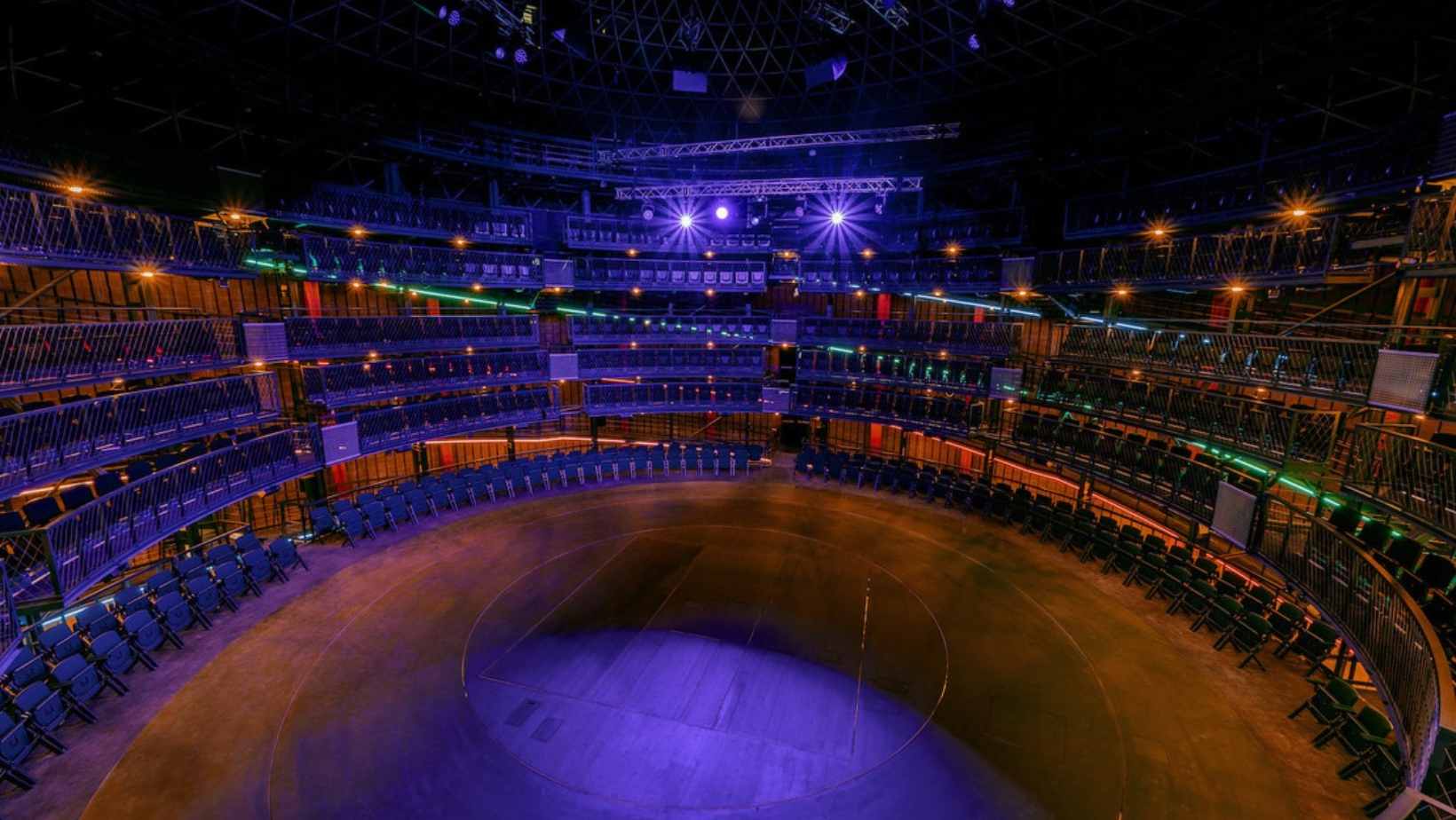
A Space Like No Other
The heart of Nová Spirála is its distinctive circular hall, featuring a 360° auditorium with a seating capacity of 800. The design, dominated by a stage with a concentric turntable, offers a unique theatrical experience—every seat provides a perfect view, and nothing is hidden from the audience.
Performers can enter and exit the stage directly through the audience, enhancing the sense of connection between artists and spectators.
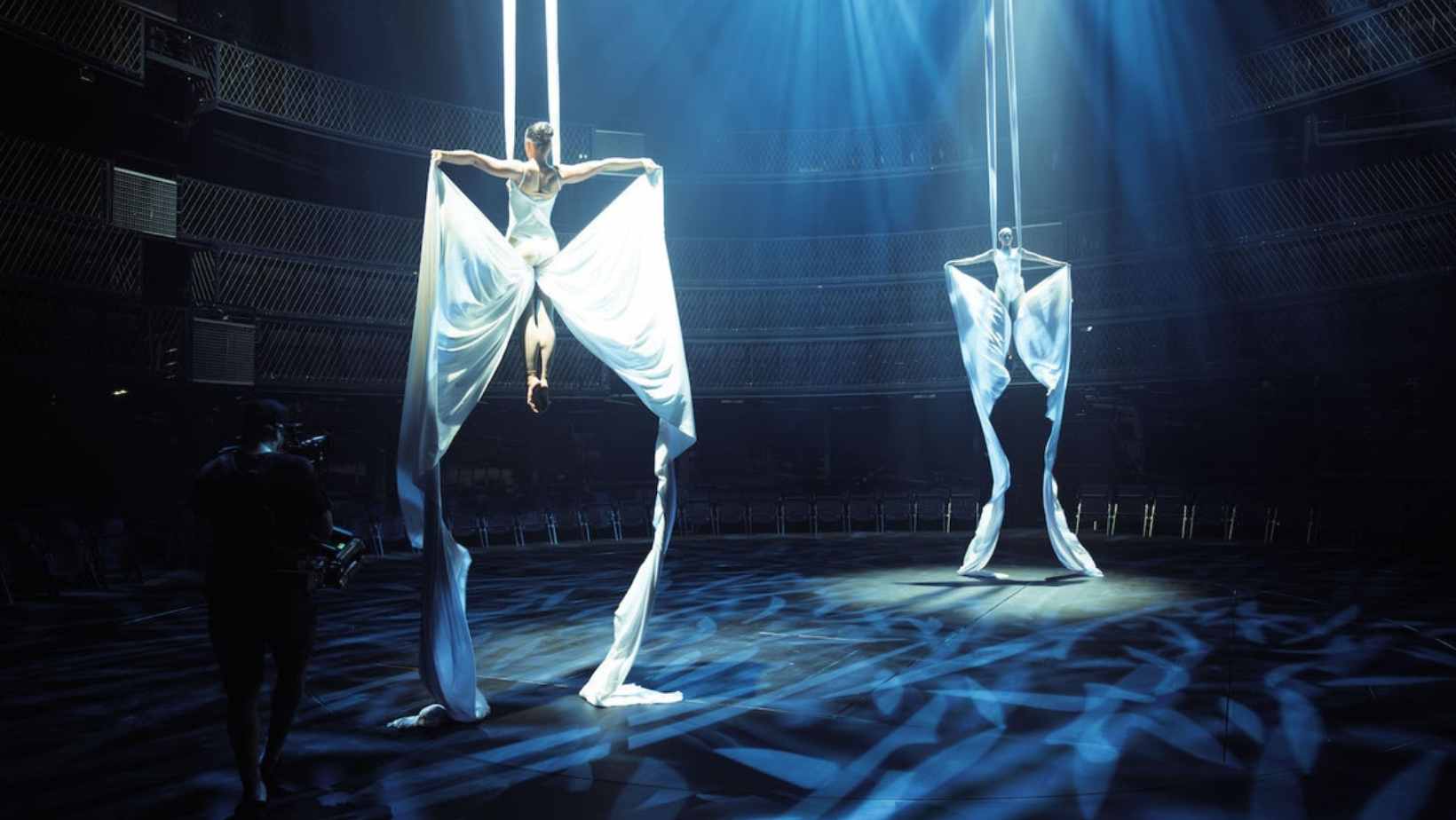
“The Spiral Theatre was significantly damaged by floods in 2002. It fell into disrepair for many years, and the city planned its demolition: it even had a demolition acreage ready. However, we managed to save this iconic space literally at the last minute, and we started its complete reconstruction,” said Pavel Vyhnánek, Deputy Mayor of the City of Prague for Finance and Budget.
In addition to the main stage of the Spiral Theatre, a small stage has also been created, which has originally served as a rehearsal room.
This space will serve as a facility for performances for smaller theatre companies, beginning musicians and smaller bands, as well as dance performances, dance evenings, as well as larger conferences and congresses.
Would you like us to write about your business? Find out more
The Czech Foreign Ministry has advised Czech nationals in Lebanon to leave the country as the violence escalates between Israel and Hezbollah.
On Saturday, the Israeli government said it had killed Hassan Nasrallah, the leader of Lebanese militant group Hezbollah, with the Israeli Defence Forces posting on X that he would “no longer be able to terrorise the world”.
It comes after a series of massive explosions levelled multiple apartment buildings in Beirut on Friday night.
There are currently 98 Czechs registered in the Drozd travel system in the Middle Eastern country.
Ettie Higgins, Unicef’s deputy representative in Lebanon, said “thousands and thousands” of people had fled southern Beirut, while hospitals were “overwhelmed” and water pumping stations had been destroyed.
“Even the most basic essential services of healthcare and water are now being rapidly, rapidly depleted,” she added.
“There was already a humanitarian crisis in Lebanon given that it’s been hosting over 1 million refugees from Syria for over a decade, so it’s rapidly escalating into a catastrophe.”
The Israeli army chief, Lt Gen Herzi Halevi, told troops on Wednesday that ongoing airstrikes were “to prepare the ground for your possible entry and to continue degrading Hezbollah”.
In Brussels, European Commission spokesperson Peter Stano said leaders will discuss the ongoing evacuation efforts at a UN Security Council meeting on Wednesday night in New York.
Stano added that if there is a need for coordinated evacuation, the EU is ready to act.
Would you like us to write about your business? Find out more
On 28th September Czechia commemorates the death of the Patron of the state – St Wenceslas.
On 28 September Czechia celebrates Saint Wenceslas Day, officially known as the Day of Czech Statehood. Statehood Day commemorates the death of an important figure in Czech history – Duke Václav (in Czech).
It was on this day back in 935 A.D. (with some sources pointing to 929) when the member of the Přemyslid dynasty Prince Wenceslas was murdered in Staré Boleslav as a result of his brother’s plot.
The Patron Saint of Bohemia
Wenceslas is the patron saint of the Bohemia region in Czechia. As the popular story goes, he was born in 907 as the son of the Duke of Bohemia.
In 922, when Wenceslas was barely 15 years old, he took over the Bohemian throne, following the early death of his father.
Himself a believing Christian, he is known for his support for the Christian faith and church and his attempts to unify the region and establish peace with the neighbouring Germanic states.
However, his policies made him many enemies, as well. One of them was his own brother Boleslav who plotted to have him murdered during a mass on 28th September. The same was the fate of the families of his supporters.
Wenceslas’ demise was immediately widely regarded as the death of a martyr; hence he was declared a saint and later – proclaimed a king by Holy Roman Emperor, Otto. I. In fact, it was his brother who pushed for the canonisation of St. Wenceslas as an act of regret.
Although it has long been an important moment of celebration for Czech citizens, Czech Statehood Day officially became a public holiday in 2000.
Would you like us to write about your business? Find out more
In September, the first 50 employees of Prague Public Transport began testing these new uniforms.
This trial period will extend for a full year to assess the functionality of the clothing in various weather and seasonal conditions, allowing experts to identify any potential issues.
Designed by renowned Czech fashion consultant and designer Lenka Bernardes Da Silva from Bernardes Fashion Atelier, the uniforms represent a modern take on the traditional workwear for public transport employees.
The updated uniforms consist of 22 items in the women’s set and 20 items in the men’s set, including different color variations to suit various roles and preferences.
Unlike the older uniforms, whose design dates back to 1995, these new sets are far more colorful and tailored to improve both the appearance and comfort of workers.
How the New Uniforms Look in Different Roles
- Dispatchers:
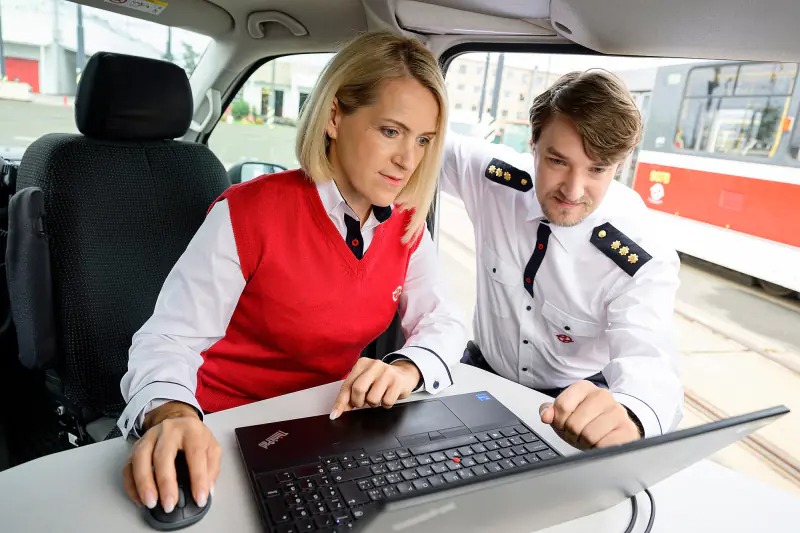
- Tram Drivers:
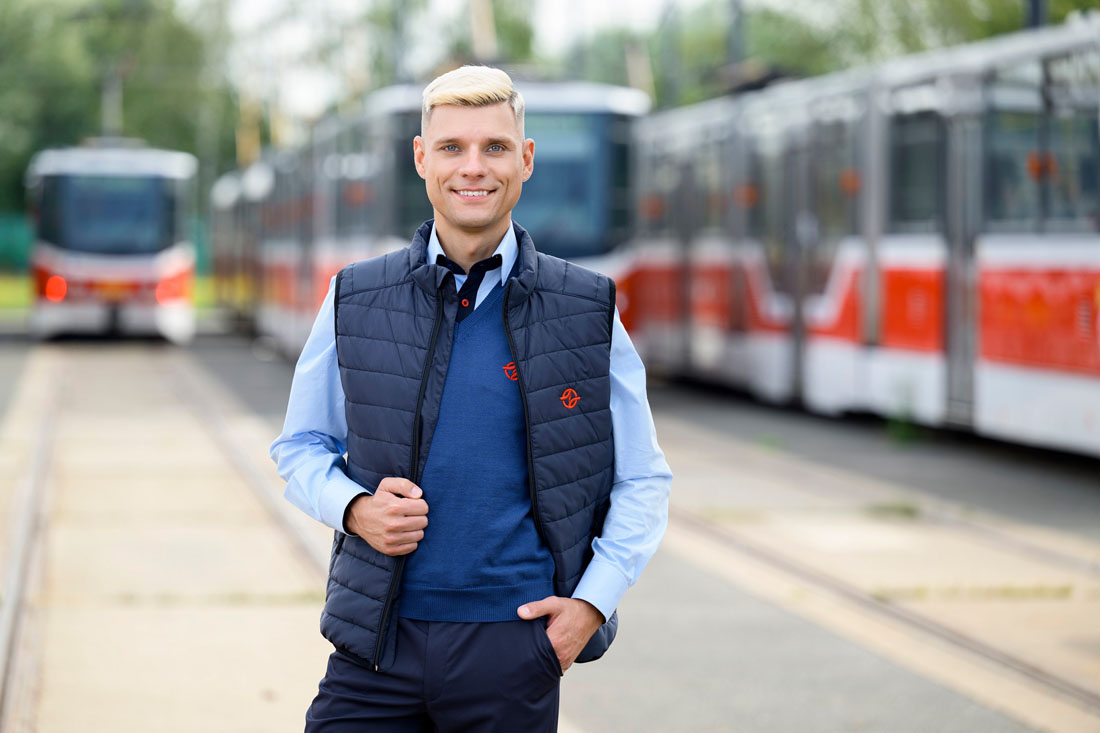
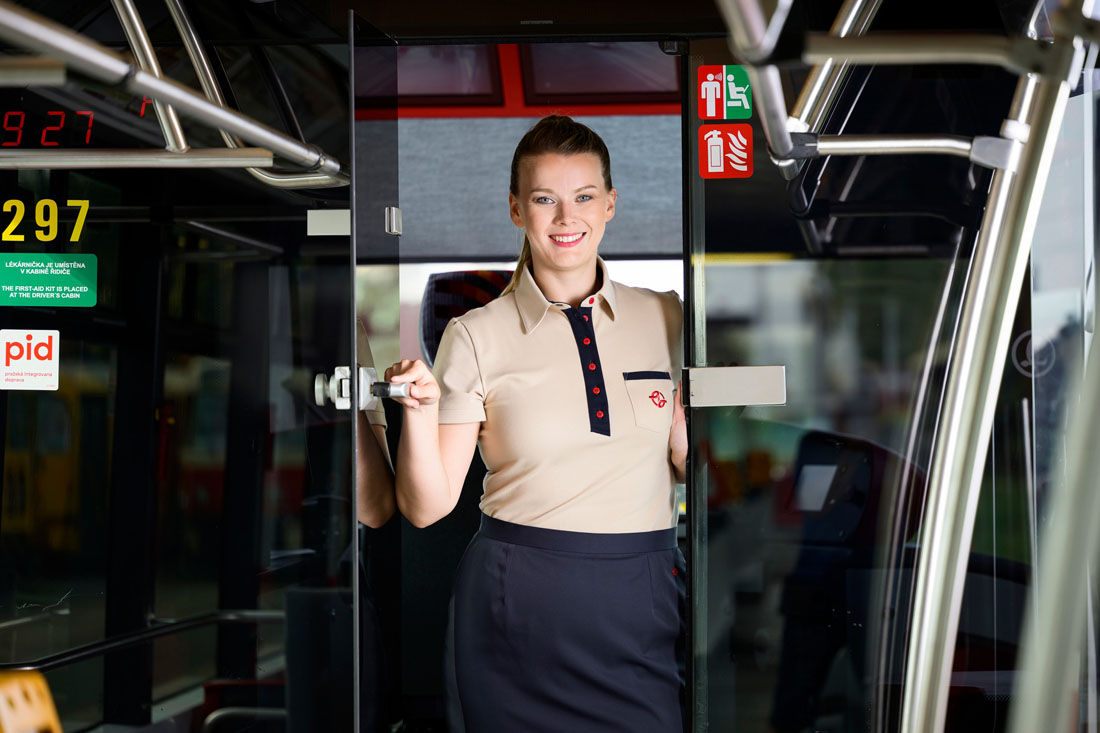
- Bus Drivers
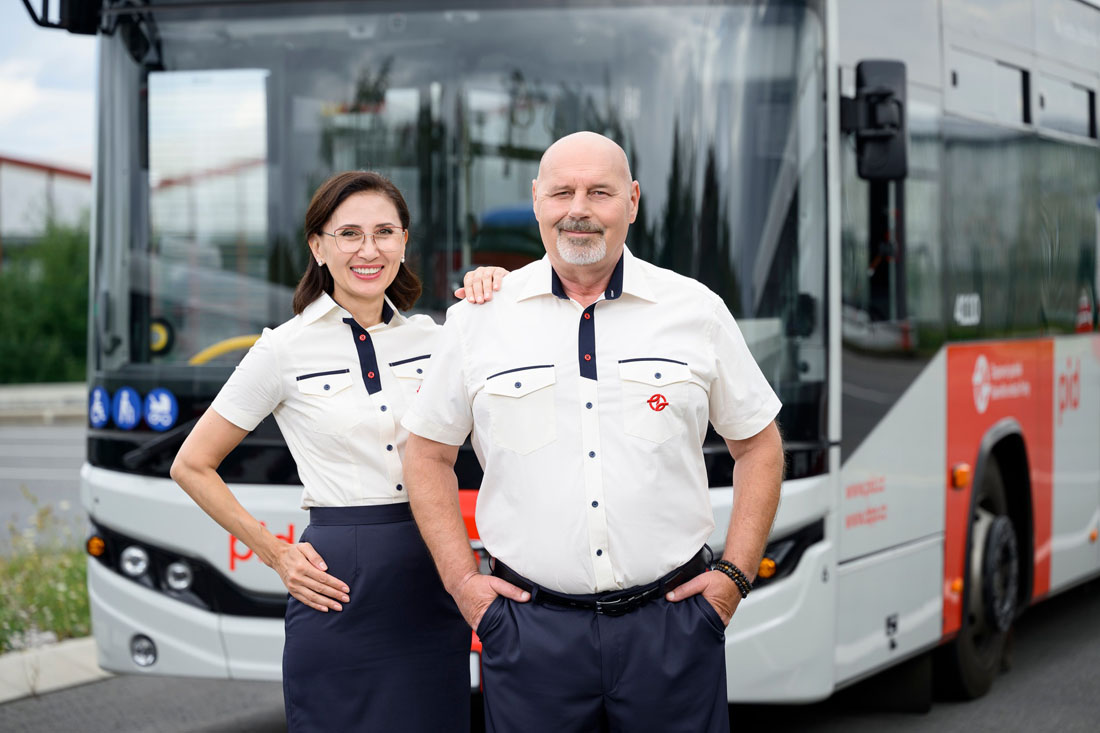
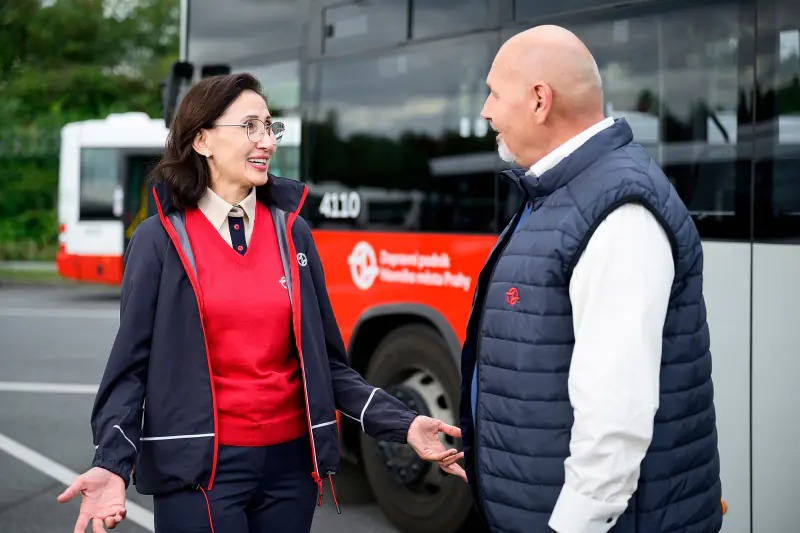
- Metro Drivers:
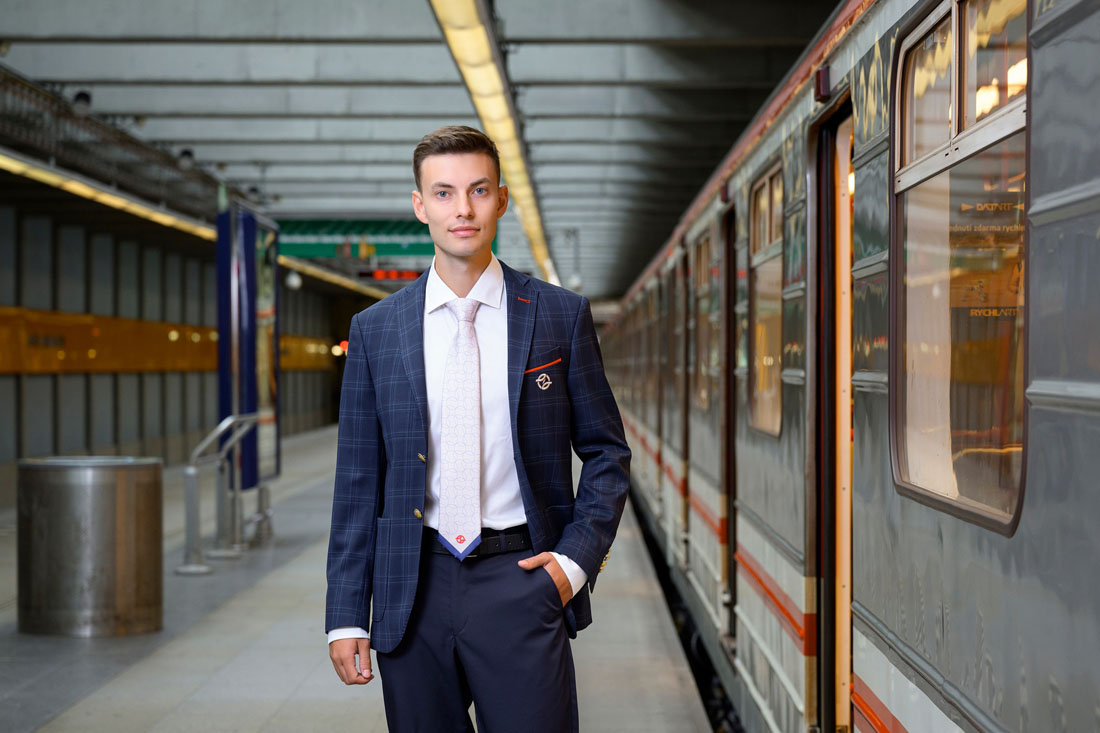
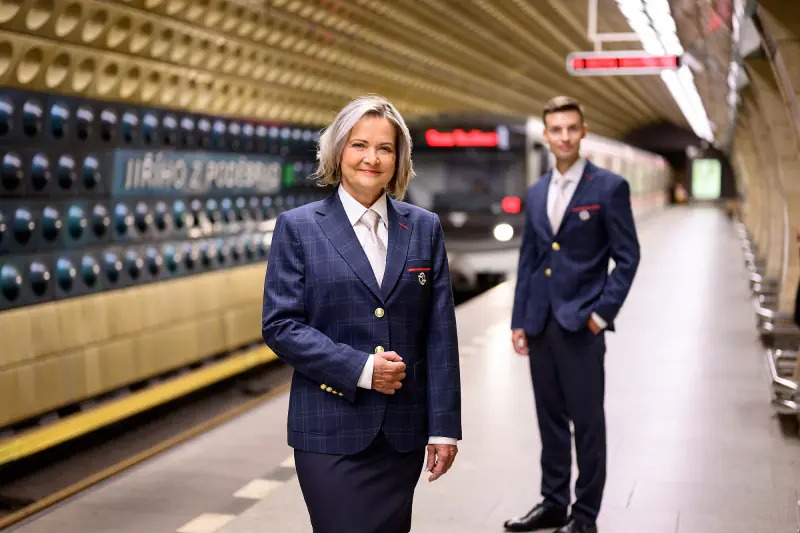
- Cashiers and Info Kiosk Staff
